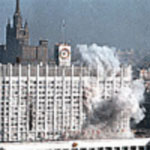Re: Moscow October 1993

Subject: Re: Moscow October 1993
From: lsell52354@aol.com (Louis D. Sell)
Date: Fri, 28 Jun 2013
In catching up on my reading I saw an exchange of e-mails on the events in Russia in October 1993. At that time I was the acting number 2 at the US Embassy in Moscow, which as those familiar with Moscow know, is only a couple of hundred yards behind the Russian White House where the Supreme Soviet opponents of Yeltsin were located. For the two weeks of the siege the embassy was a participant in events, whether we wanted to be or not. By virtue of my position I — along with many others on the embassy team — was actively involved in contacts with both sides. Hours before the final attack on the White House began early in the morning of October 4 final negotiations between the Supreme Soviet and the Russian government occurred through my apartment on the embassy compound.
Ten years ago I wrote an article on the October events which was published in the July-August 2003 edition of Problems of Post-Communism. I assume it is available on the PPC web site. People interested in the subject may find the article worthwhile. It is primarily a narrative history of the events which may be useful since in the intervening 20 years a lot of misunderstandings seem to have accumulated about what actually happened, leaving aside natural differences of interpretation or political judgment.
The article was a distillation of a book-length account of the entire crisis which Duke University Press, which published an earlier book of my on Slobodan Milosevic, was not interested in taking on and which I did not have time to pursue at the time because of other commitments. I would be happy to share that with any JRL readers who are interested but I don’t know how to send something that long (ca. 150 pages) as an e-mail attachment. I will attach the introduction, which might pique some interest.
There is a lot of criticism of Yeltsin for shelling the parliament — and it may be possible to quarrel with some of the tactics — but from my perspective by October 4 he had no choice but to use force to suppress what had become an armed rebellion. On October 3 armed Supreme Soviet backers broke out of the White House, killing a number of police and others in the process, some almost literally on the embassy entrance. That night the armed thugs who constituted the Supreme Soviet forces came perilously close to taking the Ministry of Defense building and the central Ostankino TV tower. Had they done so, Yeltsin’s government might well have collapsed. Certainly Boris Nikolayevich made many mistakes both before and after October 1993 but I have a hard time believeing that Russia would have been better off ruled by the likes of Rutskoy or Khasbulatov, let alone some of their more extreme backers.
The US provided moral-political support (and no other as far as I am aware) to Yeltsin during the crisis. But our role or influence in the events was pretty minimal and by then the choice was clear-cut. It might have been nice to have had other options but by then Jeffersonian Democrats were thin on the ground.
In some ways Yeltsin himself was one of the worst victims of the October events. He was a very emotional man and the necessity of using force, of sending Russian troops to fire on other Russians, affected him deeply. I saw him with some regularity in those days and I believe he was never the same after October 1993.
To my mind Yeltsin’s worst action around the crisis — the worst failing of the US in ignoring it — was the adoption of the post-crisis, excessively Presidential December 1993 constitution in a vote which almost certainly did not meet the legal requirements for approval.
My last comment is to note — with some amazement — that this year will mark the 20th anniversary of the October events in Moscow. I wonder if you or any of your readers know of any scholarly events or publications which will be devoted to them.
Regards,
Louis D. Sell
Whitefield, Maine
